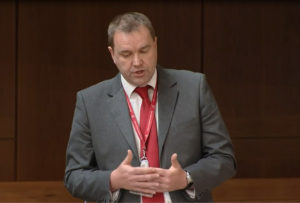Scottish Parliament Debates Spycops Again

Neil Findlay MSP addresses the Scottish parliament, 30 June 2016
Last week the Scottish Parliament had a second debate about Britain’s political secret police.
Although the majority of exposed officers from the disgraced units concerned – the Special Demonstration Squad and the National Public Order Intelligence Unit – were in Scotland, the forthcoming public inquiry is set to only cover events in England and Wales.
It has been six months since the first debate, which came shortly after the Scottish government formally asked to be included in the Pitchford Inquiry, and nothing seems to have happened.
Once again, the issue was brought to the floor by Neil Findlay MSP. In the intervening time he has marshalled a call from Scottish parliamentarians from the Labour, Conservative, Liberal Democrat and Green parties for the inquiry to include Scotland and, if this doesn’t happen, for Scotland to mount its own investigation. The SNP supports the first but not, as yet, the second point.
Findlay pressed the issue in Parliament
I know that the police, the judiciary and others will pressure the cabinet secretary to resist. Those are the very same forces that pressured politicians not to go near the Lawrence case, the Birmingham and Guildford cases, and the Hillsborough case, but brave decisions were made in the interests of truth and justice.
So, I urge the Minister for Community Safety and Legal Affairs and the cabinet secretary to do the right thing: take the brave and right decision to initiate an independent public inquiry in Scotland, should it prove to be not possible to extend Pitchford.
The call was endorsed by Green and Conservative MSPs. Speaking for the government, the SNP’s Annabelle Ewing affirmed
the Scottish Government absolutely agrees that the inquiry should look at events that took place in Scotland if that is where the evidence leads. A single, comprehensive inquiry that was able to gather all the evidence in a coherent manner would best serve the public interest on this occasion. An inquiry that was limited to England and Wales would risk doing a disservice to those who believe that they have been adversely affected by the operations of Metropolitan Police units in Scotland.
However, she simply ignored the issue of the Home Office stalling for six months and what to do if Scotland is shut out of the inquiry. Neil Findlay seized on the omission, asking
Is the minister saying that, if the Home Secretary does not expand the Pitchford inquiry, there will be no Scottish inquiry? If that is the case, can she say very clearly today that victims in Scotland will have no route to justice? Let us be up front and straight about it. Let us not be choosy with our language; let us make it very clear what she means.
But, again, Ewing avoided answering the question and repeated that they were concentrating on inclusion in Pitchford. Conservative MSP Douglas Ross asked the question for a third time, and Ewing simply repeated her previous point once more. Labour’s Claire Baker asked it a fourth time and was also subjected to repetition of a point that did not answer the question.
The session was not entirely fruitless, however. Findlay didn’t just highlight the stasis regarding the Pitchford Inquiry, he also put sensational new information into the public domain.
Today, under the privilege that this Parliament gives me, I can name Gayle Burton, who is a former head of human resources at the Costain construction company, who now works for the Jockey Club and who has been identified as the key link between the construction industry, the Consulting Association and Special Branch. Her name is identified as the source of information on files of blacklisted Scottish workers.
We also know of the involvement during the 1984 miners’ strike of Stella Whitehouse, now Dame Stella Rimington, the former head of MI5, who was regularly on the picket line at Polkemmet colliery, not 3 miles from my house, during that period.
The illegal links between police, private surveillance and big business underpin much of the spycops’ targeting of political activists. It is as great an injustice whether perpetrated in England or Scotland, so all its victims deserve the truth.
As we said last month, it does not take six months to make a simple alteration to the terms of the Pitchford Inquiry. The start date looms ever closer and it is beginning to look like the Home Office is stonewalling and that the lack of a response will effectively become a refusal once the inquiry begins.
If the Scottish government – along with the German, Northern Irish and others who have made similar demands – do not set a deadline soon, they are effectively accepting this. They are running the increasing risk of being left behind, unable to secure the truth for their citizens abused by English spycops.
Video of Thursday’s debate is on our Youtube channel, and a full transcript can be found here.
